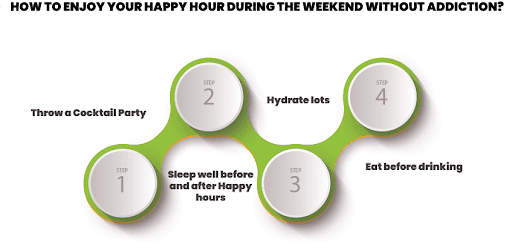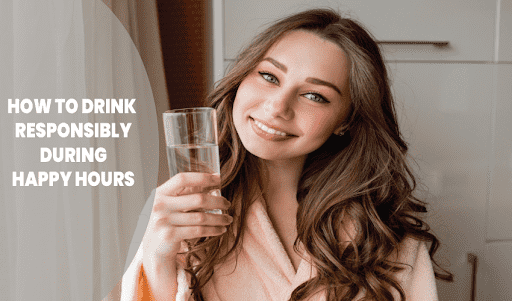Introduction
Drinking and merry-making have been used synonymously since time immemorial. Happy hours are a product of this practice with the added advantage of social gathering, meeting new clients, fixing business away from the office, and loosening up the daily stress. But in an uncontrolled fashion, it can prove more damaging than constructive. However, how do we find our happiness and feel good?
Our Wellness Programs
What is Happy Hour?
A happy hour generally means a period in a day at bars or restaurants where drinks are available at much lower prices with complimentary snacks and hors d’oeuvre. It is also known as cocktail hours[1], and its primary motive is to draw new customers or increase sales during the off hours of a restaurant (say 5 PM to 7 PM), especially before the start of weekends. The idea originated during the Prohibition era when there was a drinking ban. People would sneak around in private lounges hidden from the public eye to grab a drink before eating at a restaurant.
Looking for services related to this subject? Get in touch with these experts today!!
Experts

Banani Das Dhar

India
Wellness Expert
Experience: 7 years

Devika Gupta

India
Wellness Expert
Experience: 4 years

Trupti Rakesh valotia

India
Wellness Expert
Experience: 3 years

Sarvjeet Kumar Yadav

India
Wellness Expert
Experience: 15 years

Shubham Baliyan

India
Wellness Expert
Experience: 2 years
What is the Reality of Happy Hour?
The idea of ‘happy hour’ is not only a marketing gimmick[2] but also a popular retreat among nine to five office workers because it provides:
- A getaway for socialising between co-workers in relaxed environments away from the formality of offices
- An excellent opportunity to get a date
- A great way to bond and converse with otherwise tight-lipped colleagues
- A place for group entertainment like games, wrestling competitions, matches, music, movies and group dancing
But a sad reality about happy hour is binge drinking often leads to unpleasant and criminal incidents like sexual assault, bullying, violence, property vandalism, unasserted sexual behaviour, breaking of the law, physical harm, and even death due to drunk driving and traffic accidents.
Uncontrolled drinking by some also affects their colleagues or friends who do not drink; for example, they can get involved in illegal and violent activities of the intoxicated ones. Sober people have to care for their drunken friends, willingly or unwillingly. It may hamper their plans or expose them to traffic accidents or undesired sexual encounters.
What is the Link between Happy Hour and Addiction?
Research[4] suggests a link between alcoholism or binge drinking and a drop in the price of alcohol. Hence, the after-effects of the so-called ‘happy hours’ do not seem so happy after all!
The simple concept of complimentary drinks during happy hours affects college students and adolescents more than office-goers to resort to group drinking. Teenagers below their legal drinking age are more prone to high intoxication than adults; thus, they get more exposed to alcohol addiction.
Alcohol addiction harms females in their reproductive years as drinking during pregnancy leads to foetal alcohol syndrome, which may even cause stillbirth.
Even adults battling alcohol addiction can get triggered by participating in happy hour drinking. Feeling left out in the crowd and peer pressure may also lead them to relapse and jeopardise their path to recovery.
Alcohol addiction is a severe issue in the modern world as all this ultimately leads to derogation in living standards and overall productivity of the generation.

How to Enjoy Your Happy Hour during the Weekend without Addiction?
The concept of ‘happy hours’ has always been fruitful for socialising[3] and fun, and you don’t have to refrain from all these good things to avoid drinking. You can prep yourself for an addiction-free weekend getaway that promises the same level of fun and networking.
1. Throw a Cocktail Party
Cocktails are concoctions with low alcohol content. These drinks are refreshing and equally inviting as a neat drink. Host a party at the nearest hangout zone or coffee shop; you don’t have to worry about driving a drunken guest home. Fun weekends and no hangovers!
2. Sleep well before and after Happy hours
Drinking and hangovers disrupt your R.E.M. sleep cycle and drastically decrease blood sugar levels. Make sure to get enough sleep every night before and after the happy hours.
3. Hydrate lots
Drinking dehydrates your body, which is the main reason for bad hangovers. Order a large glass of sparkling water or lemon soda before drinking, and keep sipping a glass or two in between drinks. Keep a couple of bottles of water near your bed so that after the happy hour, you can replenish your body after returning home.
4. Eat before Drinking
Drinking on an empty stomach causes more intoxication. Proteins prevent quick absorption of alcohol and reduce your chances of getting tipsy. Order a full meal of steak, bread, milk or cheesy pasta before drinking. It will also prevent you from snacking on fried food.
5. Skip Sugary Drinks and foods
Drinks combined with highly concentrated fructose, like corn syrup and energy drinks, put pressure on the body’s metabolism more than only alcohol. Opt for water, freshly made juice or seltzers to go with your alcohol.
6. Don’t Indulge in Mixing Different Drinks.
Studies[1] show that mixing different types of alcohol is difficult to metabolise and causes more morning dizziness. Dark-coloured drinks like bourbon and rum contain more congeners (natural products of fermentation and distillation), further hampering cognitive abilities. Choose clear liquids like vodka over rum.
7. Go for the Wines
A glass of wine is high in calories, containing as many as 120 calories each. Both red and white wine is healthy, loaded with antioxidants, low in alcohol content and takes more time to finish than mixed alcohols, thereby causing minor intoxication. So, reap the happy hour benefits by choosing wine-based drinks and drinking responsibly!
8. Lastly, consider your stage of recovery before accepting happy hour invitations.
Invitations from peers to join in a frolicking happy hour is a great idea but before, realise your capability to limit alcohol to a sane quantity. Spend time with friends and family, talk with your mentors, therapist and support group friends, and weigh your cons before accepting an invitation for happy hours.
Conclusion
Happy hours should mean pleasant times spent with friends and family to unwind from the week-long stress. One should feel satisfied and more energetic after a happy hour outing rather than a throbbing headache; moderation is the key. Use this opportunity to make better perpetual impressions and forge new friendships by avoiding blacking out.
| [1] D. J. Rohsenow et al., “Intoxication with bourbon versus vodka: effects on hangover, sleep, and next-day neurocognitive performance in young adults,” Alcohol. Clin. Exp. Res., vol. 34, no. 3, pp. 509–518, 2010. [2] J. R. Averill and T. A. More, “Can money buy happiness? Not until we can clone it,” Am. J. Med., vol. 92, no. 1, p. III–IV, 1992. [3] W. Tatarkiewicz, Analysis of Happiness. Leiden: Nijhoff, 1976. [4] X. Xu and F. J. Chaloupka, “The effects of prices on alcohol use and its consequences,” Alcohol Res. Health, vol. 34, no. 2, pp. 236–245, 2011. |














